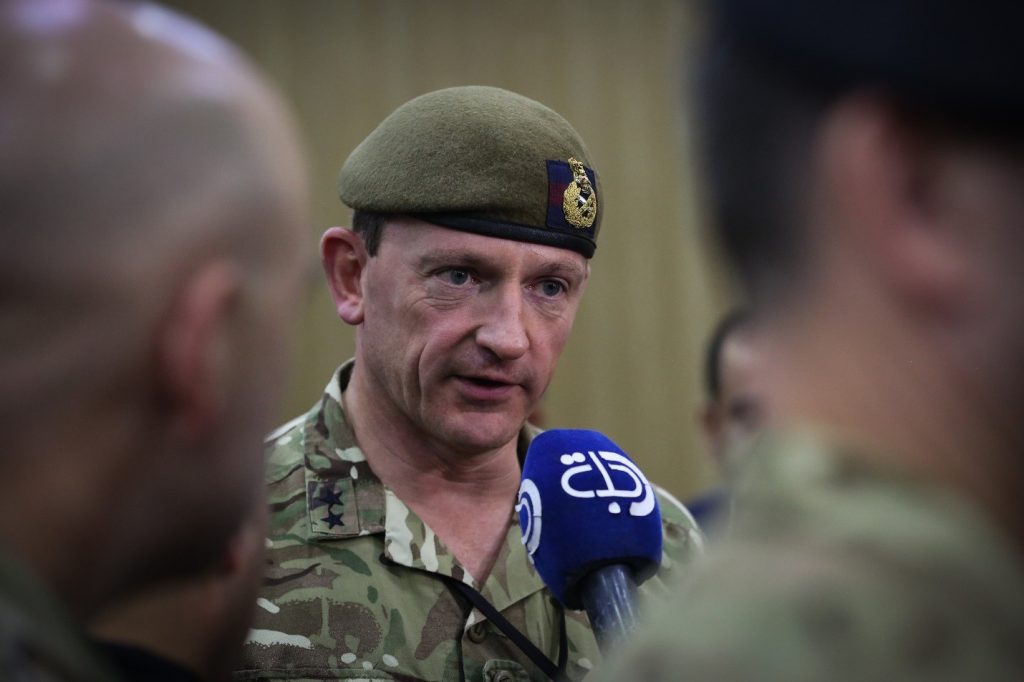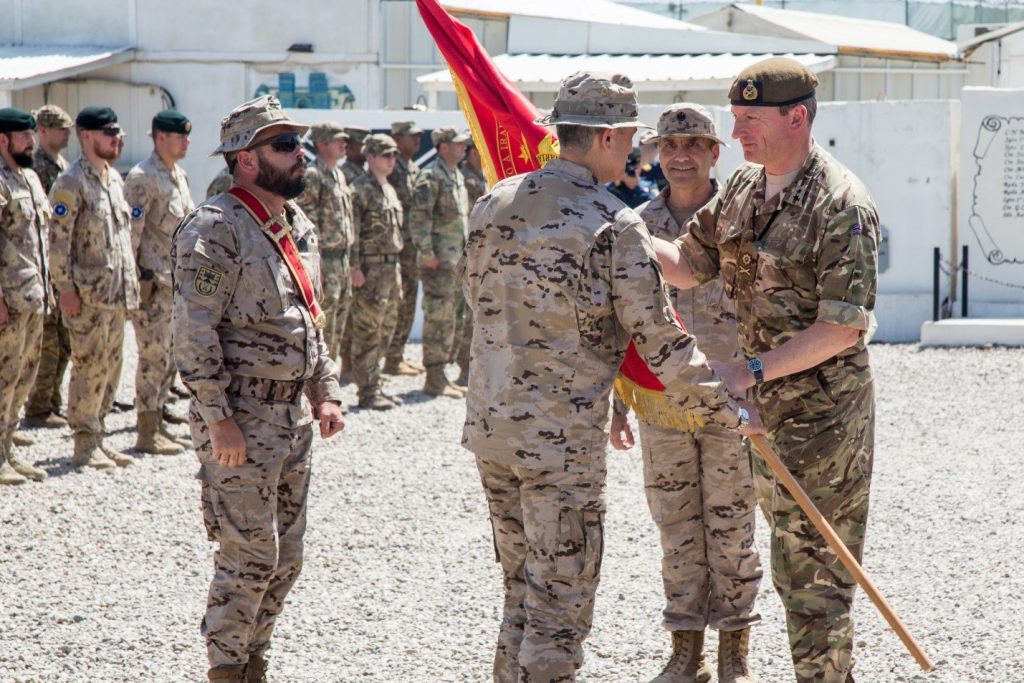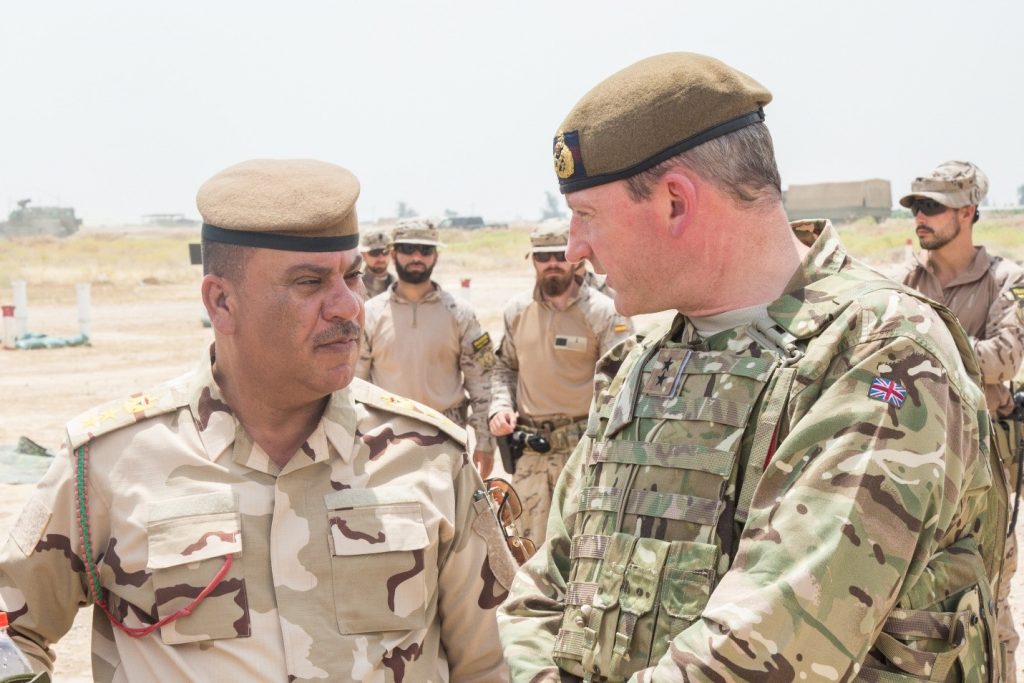You can listen to this interview and future episodes of “On the Line” on Apple Podcasts, Buzzsprout, Spotify, Stitcher, iHeart Radio, TuneIn & Alexa.
Nancy. Hello there, I’ll be speaking today with Major General Chris Ghika, deputy commander of Operation Inherent Resolve. For those of you who don’t know, Operation Inherent Resolve is the military operation set up to tackle Daesh in Iraq and Syria. 33 Coalition partners have so far provided troops to support the operation. General Ghika joins us today from Baghdad where he has been serving in his current role since 2018.
Nancy: Thank you for your time General Ghika. How are you doing today?
General Ghika. I’m very well thanks Nancy.

Nancy. The Coalition declared military success over Daesh on March 23rd, 2019. What has changed since then?
General Ghika. I think the things that strike me are first of all, that the state and the Iraqi population has seen what Daesh looks like and they are absolutely resolved never to let it happen again. So, there’s a really strong sense of Iraqi identity to root out and destroy Daesh in partnership with the Coalition. The second thing that really strikes me on a daily basis is the Iraqi security forces’ partnership with the Coalition has made them a really credible military force. We’ve built capability together, their resolve is strengthened, they’re better led, they’ve got better equipment, are more self-confident and they are able to do operations which have seen them beat Daesh in physical conflict and it has made them absolutely resolved to get after and attack on Daesh’s underground network. I think I see an increasingly stable Iraq and I contrast the growing capabilities of the Iraqi security forces with Daesh who I see as increasingly pressured, they’re being forced underground, the Iraqi security forces are denying them safe haven, they’ve lost the support of the population. The two sides are completely different to the way they were in 2014 and 2015 and I think that’s tremendously pleasing and gives me real hope.
Nancy. That’s very good to hear. How does a military force successfully operate against an insurgency group that Daesh has turned into, that doesn’t have territory or an obvious frontline?
General Ghika. That’s a really good question because fighting an underground network is far more difficult than fighting an organisation that is in open combat and in force-on-force warfare with frontlines. I think the first thing that you need is some excellent intelligence and information about what Daesh is trying to do and how they’re trying to act. And the Iraqi security forces intelligence capability is really first class now, it’s grown exponentially over the past few years and so the intelligence, the information and the organisational information you need to fight this kind of network is there. The second thing I think you need to do is have a really population-centric approach to your campaign. You need to engage the population; you need to show them that life is better under the Iraqi security forces and the government of Iraq rather than under the corrupt and vile rule of Daesh. And the Iraqi security forces have done this and so there’s really good evidence of where they have engaged with the population, they have sought the advice of the population, they have really got together with the population in a partnership to beat Daesh. And I think the third thing is the pure military capability that you bring to a fight like this. And you need to keep Daesh moving, you need to be unpredictable and the ISF have done that very effectively in just the last few months in places like the Makhmur, the Hamrin mountains and places like that in Ninevah and down to Diyala.

Nancy. Now that the Coalition is focusing more on the stabilisation of liberated areas, and stabilisation is very critical going forward, how do the Coalition’s military forces support this progress?
General Ghika. Well you’re quite right to say that stabilisation is critical because it is absolutely fundamental to showing people a better life away from Daesh. I think that the Iraqi Security Forces and the Coalition, the first thing that we do is provide security in which stabilisation can take place. By advising and assisting the Iraqi Security Forces, the Coalition enables the Iraqi Security Forces to provide security in particular areas and inside that security bubble stabilisation can take place. For example, in somewhere like Mosul, some of the security that is being provided is enabling the agencies like the UNDP to come and conduct operations such as water purification, housing, cash for work, rebuilding and clearance of the hospital. I think the second thing the Coalition can do is we can bring in together the many agencies which are involved in the stabilisation work here both large and small. We have international, civilian led organisations such as the UN and the ICRC, we have local governance agencies, we’ve got those that provide services some for education, job opportunities and some who look after the return of IDPs. We are able to bring the agencies together so that they conduct their operations in a coordinated manner.
Nancy. General Ghika, what has surprised you the most about the role you’re in?
General Ghika. That’s a really great question. I suppose when I think about that I take everything against my reference point of my previous tour in Iraq. So, I was working in the first Coalition headquarters to set up in Baghdad in 2014 and 2015. When I came back three years later in 2018, I looked at what I saw and there were somethings that really surprised me. The first is that Daesh were no longer the force they once had been. They’d been driven underground, they had lost most of their people, their leaders were weak, and they simply weren’t an enticing prospect for people coming from around the world. The second was to see just how far the Iraqi security forces had come with their operational capability and, together with the Coalition, what a significant joint and combined effect they were having on Daesh. Then the thing that has always impressed me I think is the resilience of the Iraqi people. To be resilient to the shocks of conflict and when I went to visit places like Mosul and some of the regions in Ninevah, their confidence was still high, they were still confident that Daesh had gone and their resilience and their will to make a better life for themselves didn’t surprise me, but it made me more positive about the work that we do.
Nancy. In the next 12 months, what are the three most important things that you feel the Coalition needs to do to continue the success against Daesh.

General Ghika. Well I think the first thing we need to do is continue our partnerships with the ISF in Iraq, with the internal security forces in Syria because they, in our partnership with us, are delivering a counter Daesh effect on the ground every single day. I think the second is we need to continue our ability to build partner capacity efforts in Iraq and Syria. Our assistance to the security forces to enable them to get stronger, to get more confident, to get more sophisticated in the operations they conduct is absolutely critical. But then I think we also need to explain what’s happening here to the Coalition nations, we need to tell our story, we need to tell the over 30 nations that are here the real sense of progress that’s being made. Because the over 30 nations here in the Middle East, part of the international Coalition of over 74 nations and 5 organisations, is providing real strength of purpose, real strength of message and real strength of resolve.
Nancy. That’s very promising to hear. Thank you very much for your time General Ghika, it’s been lovely talking to you.
General Ghika. Thank you, Nancy.
Nancy. Thank you.

